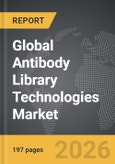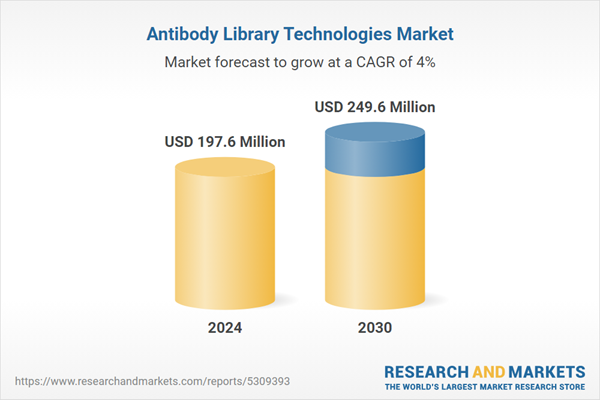Global Antibody Library Technologies Market - Key Trends and Drivers Summarized
Why Are Antibody Library Technologies Pivotal in Modern Biotech?
Antibody library technologies have become a cornerstone in modern biotechnology, particularly in the field of therapeutic antibody discovery and development. These technologies involve creating vast collections of antibody variants, known as libraries, which can be screened to identify those with the desired properties for treating diseases. Phage display, one of the most prominent antibody library technologies, allows for the rapid and efficient selection of high-affinity antibodies from large pools of variants. This method has revolutionized drug discovery, enabling the development of monoclonal antibodies that are used to treat a variety of conditions, including cancers, autoimmune diseases, and infectious diseases. The ability to quickly identify potent antibodies from these libraries accelerates the drug development process and enhances the likelihood of clinical success.How Are Technological Advancements Shaping Antibody Library Technologies?
Technological advancements are significantly enhancing the capabilities and efficiency of antibody library technologies. Next-generation sequencing (NGS) has transformed the way antibody libraries are constructed and analyzed, allowing researchers to comprehensively characterize and optimize antibody repertoires. Additionally, advancements in synthetic biology have enabled the creation of highly diverse and tailored libraries that can target specific antigens with greater precision. Artificial intelligence (AI) and machine learning are also being integrated into the screening process, improving the accuracy and speed of antibody selection. These technologies not only streamline the discovery process but also reduce costs and increase the potential for finding novel therapeutic antibodies. The integration of these cutting-edge technologies is driving innovation and expanding the applications of antibody library technologies in drug discovery.Why Are Antibody Library Technologies Essential for Personalized Medicine?
Antibody library technologies are essential for the advancement of personalized medicine, which aims to tailor treatments to individual patients based on their genetic and molecular profiles. By utilizing highly diverse antibody libraries, researchers can identify antibodies that are specifically effective against the unique biomarkers present in a patient's disease. This approach enhances the efficacy and reduces the side effects of treatments, offering a more targeted and personalized therapeutic strategy. The ability to rapidly screen and identify antibodies that bind to rare or previously undruggable targets is particularly valuable in the development of treatments for complex and refractory diseases. The ongoing research and development efforts in this field are focused on creating antibodies that can be customized to meet the specific needs of individual patients, thereby improving treatment outcomes.What Factors Are Driving Growth in the Antibody Library Technologies Market?
The growth in the antibody library technologies market is driven by several factors related to technological advancements, expanding applications, and evolving industry demands. The increasing investment in biotechnology and pharmaceutical research is a major driver, as companies seek to develop innovative antibody-based therapies. Advances in next-generation sequencing and synthetic biology are enhancing the creation and screening of antibody libraries, making these technologies more efficient and effective. The rising demand for personalized medicine, with its focus on tailored treatments, is expanding the addressable market for antibody library technologies. Additionally, the growing prevalence of chronic diseases and the need for new therapeutic options are driving the adoption of these technologies. Strategic collaborations and partnerships in research and development are fostering innovation and expanding the applications of antibody libraries. The integration of AI and machine learning in the antibody selection process is also accelerating market growth by improving the speed and accuracy of antibody discovery. Collectively, these factors are shaping a dynamic and rapidly evolving market landscape for antibody library technologies.Report Scope
The report analyzes the Antibody Library Technologies market, presented in terms of market value (USD). The analysis covers the key segments and geographic regions outlined below.- Segments: Technology (Phage Display, Yeast Display, Ribosome Display, Mammalian Cell Display); Application (Drug Discovery & Development, Research, Other Applications); End-Use (Biopharmaceutical Companies, Contract Research Organization, Academic & Research Institutes).
- Geographic Regions/Countries: World; United States; Canada; Japan; China; Europe (France; Germany; Italy; United Kingdom; and Rest of Europe); Asia-Pacific; Rest of World.
Key Insights:
- Market Growth: Understand the significant growth trajectory of the Drug Discovery & Development Application segment, which is expected to reach US$171.1 Million by 2030 with a CAGR of 4.1%. The Research Application segment is also set to grow at 3.9% CAGR over the analysis period.
- Regional Analysis: Gain insights into the U.S. market, valued at $53.9 Million in 2024, and China, forecasted to grow at an impressive 3.8% CAGR to reach $39.7 Million by 2030. Discover growth trends in other key regions, including Japan, Canada, Germany, and the Asia-Pacific.
Why You Should Buy This Report:
- Detailed Market Analysis: Access a thorough analysis of the Global Antibody Library Technologies Market, covering all major geographic regions and market segments.
- Competitive Insights: Get an overview of the competitive landscape, including the market presence of major players across different geographies.
- Future Trends and Drivers: Understand the key trends and drivers shaping the future of the Global Antibody Library Technologies Market.
- Actionable Insights: Benefit from actionable insights that can help you identify new revenue opportunities and make strategic business decisions.
Key Questions Answered:
- How is the Global Antibody Library Technologies Market expected to evolve by 2030?
- What are the main drivers and restraints affecting the market?
- Which market segments will grow the most over the forecast period?
- How will market shares for different regions and segments change by 2030?
- Who are the leading players in the market, and what are their prospects?
Report Features:
- Comprehensive Market Data: Independent analysis of annual sales and market forecasts in US$ Million from 2024 to 2030.
- In-Depth Regional Analysis: Detailed insights into key markets, including the U.S., China, Japan, Canada, Europe, Asia-Pacific, Latin America, Middle East, and Africa.
- Company Profiles: Coverage of players such as Abcam PLC, AbCheck s.r.o., Abgent, Inc., a WuXi AppTec company, Abwiz Bio Inc., Abzena PLC and more.
- Complimentary Updates: Receive free report updates for one year to keep you informed of the latest market developments.
Some of the 47 companies featured in this Antibody Library Technologies market report include:
- Abcam PLC
- AbCheck s.r.o.
- Abgent, Inc., a WuXi AppTec company
- Abwiz Bio Inc.
- Abzena PLC
- Adimab LLC
- AnaptysBio, Inc.
- AvantGen, Inc.
- Creative-biolabs
- Dyax Corporation
- Invenra, Inc.
- MorphoSys AG
- Philogen S.p.A.
- Vaccinex Inc.
- Xoom Corporation
This edition integrates the latest global trade and economic shifts into comprehensive market analysis. Key updates include:
- Tariff and Trade Impact: Insights into global tariff negotiations across 180+ countries, with analysis of supply chain turbulence, sourcing disruptions, and geographic realignment. Special focus on 2025 as a pivotal year for trade tensions, including updated perspectives on the Trump-era tariffs.
- Adjusted Forecasts and Analytics: Revised global and regional market forecasts through 2030, incorporating tariff effects, economic uncertainty, and structural changes in globalization. Includes historical analysis from 2015 to 2023.
- Strategic Market Dynamics: Evaluation of revised market prospects, regional outlooks, and key economic indicators such as population and urbanization trends.
- Innovation & Technology Trends: Latest developments in product and process innovation, emerging technologies, and key industry drivers shaping the competitive landscape.
- Competitive Intelligence: Updated global market share estimates for 2025, competitive positioning of major players (Strong/Active/Niche/Trivial), and refined focus on leading global brands and core players.
- Expert Insight & Commentary: Strategic analysis from economists, trade experts, and domain specialists to contextualize market shifts and identify emerging opportunities.
Table of Contents
Companies Mentioned (Partial List)
A selection of companies mentioned in this report includes, but is not limited to:
- Abcam PLC
- AbCheck s.r.o.
- Abgent, Inc., a WuXi AppTec company
- Abwiz Bio Inc.
- Abzena PLC
- Adimab LLC
- AnaptysBio, Inc.
- AvantGen, Inc.
- Creative-biolabs
- Dyax Corporation
- Invenra, Inc.
- MorphoSys AG
- Philogen S.p.A.
- Vaccinex Inc.
- Xoom Corporation
Table Information
| Report Attribute | Details |
|---|---|
| No. of Pages | 197 |
| Published | February 2026 |
| Forecast Period | 2024 - 2030 |
| Estimated Market Value ( USD | $ 197.6 Million |
| Forecasted Market Value ( USD | $ 249.6 Million |
| Compound Annual Growth Rate | 4.0% |
| Regions Covered | Global |









